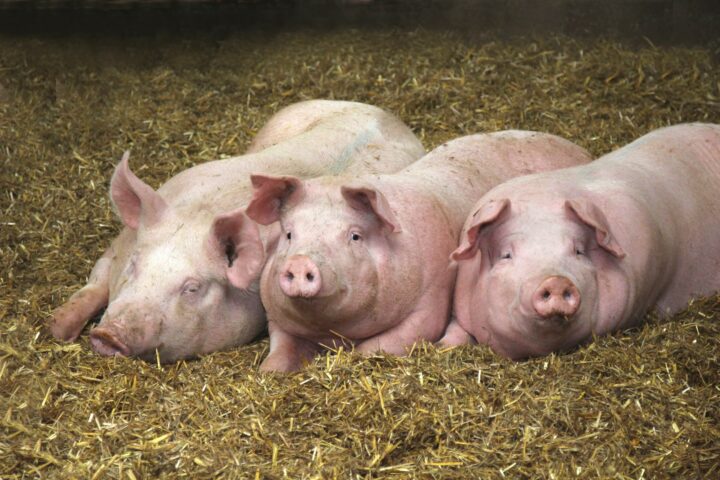
When surveys create fear
Surveys on technologies such as genetic engineering often focus on risks and spread panic instead of promoting a balanced discussion of the pros and cons. A striking example is the environmental indicator of the Federal Statistical Office. Social scientist Angela Bearth is highly critical of the survey.
Tuesday, November 26, 2024
The public debate on new technologies such as genetic engineering or 5G mobile communications is often conducted emotionally. Current surveys encourage this by stirring up fears instead of enabling an objective consideration of risks and benefits. One example of this is the environmental indicator, a survey conducted by the Federal Statistical Office (FSO) on the subject of hazards. Using simplistic questions, it generates distorted perceptions. In an article on the progressive Agrarwende.ch platform of the Eco-Progressive Network association, social scientist Angela Bearth addresses the issue.
In the BfS survey, Swiss people were asked about their attitudes towards genetic engineering, nuclear power and mobile phone antennas. It is striking that over 50 per cent of those surveyed rate mobile phone antennas as «rather dangerous». This is despite the fact that more than half of the population undoubtedly uses mobile phones intensively every day. The assessment is even more negative when it comes to «genetic engineering for food production» and the «use of chemical crop protection». However, the results convey a very negatively distorted picture of the population's actual risk behaviour.
Possible benefits are ignored
The way the questions are phrased is to blame. This was also the problem with the BfS survey. Bearth cites the example of the question: «How dangerous do you think genetic engineering is?» With questions like this, many studies already focus on risk perception instead of asking a neutral question. In Bearth's view, this already implies that there is a risk. The result: respondents are tempted to give one-sided answers.
The social scientist criticises this approach and emphasises that such questions do not adequately reflect the complexity of the topic. They would completely ignore the weighing up of possible risks and personal or social benefits. Instead, negative feelings are evoked in the respondents due to certain associations, which makes an objective dialogue considerably more difficult.
Anti-genetic engineering initiative cites misleading study
The one-sided survey by the Federal Statistical Office (FSO) is already being eagerly used by certain groups. For example, by the initiators of the people's initiative for GMO-free food, which was launched by BioSuisse and related groups. They use the questionable survey results, among other things, as supposed proof that the population rejects new breeding methods. According to their argument, 70% of those surveyed rate genetic engineering as «very» or «rather dangerous», An excerpt from a presentation by the Swiss Alliance Gentechfrei, which was shown at this year's Migros Consumer Conference, illustrates this misleading argument. The Swiss Alliance for a Gene Technology-Free Environment is one of the organisations supporting the initiative. According to the logic of the initiative's sponsors and the environmental indicator cited as evidence, motorised traffic would also have to be banned.
For Bearth, there is no question that surveys must simplify complex issues. Nevertheless, in a democratic society, consumers should also be given the chance to see possible advantages. «Surveys on new technologies should do justice to the complexity of the initial questions regarding the regulation of gene technology», Bearth clarifies in her article.
In such studies, it is often forgotten that every risk also has a twin: the benefit. Innovative technologies are developed and used to fulfil a specific purpose – to provide a concrete benefit. However, if surveys focus exclusively on fears, the benefits are suppressed. As Bearth further explains, it is known from psychology that people tend to fall back on simple rules of thumb when forming opinions when faced with uncertain decisions. If the respondents know little about a topic, they are guided by associations. Bearth explains the phenomenon as follows: «When asked whether they would prefer a normal or a genetically modified potato, most people choose the ‹normal› potato because the term genetic engineering triggers a vague unease or because they imagine a ‹Frankenstein potato›.»
Surveys must do justice to the complexity of the topic
According to the social scientist, good surveys should therefore be based on two principles. The first principle is that the way the question is asked should not influence the answer. Instead of asking about the assessment of the risks of genetic engineering, more neutral questions such as «What is your opinion on the use of genetic engineering in agriculture?» should be used.
The second principle is that respondents must understand the purpose of the questions. Providing them with background information can help to ensure that answers are not based solely on vague associations. If survey participants are aware of the specific benefits, they are more willing to accept a certain degree of uncertainty or risk. Angela Bearth writes: ‘We know from research that people are willing to accept a small degree of uncertainty or risk if they see a relevant benefit.’
A recent survey by the research institute gfs.Bern on genome editing confirms this assessment. While only 18 per cent of respondents were immediately in favour of genome editing, acceptance rose to over 80 per cent when the technology was used to breed resistant potato or apple varieties or to reduce the use of crop protection in agriculture. The sudden increase in approval is clear evidence that a specific benefit leads to a more nuanced opinion.
In conclusion, it can be said that surveys that focus purely on fear do not reflect the actual will of consumers. To achieve this, a weighing up of the concrete benefits and risks of several technologies must always take place. Surveys should support this process instead of hindering it. A balanced approach can promote an objective dialogue and avoid an emotionalised debate.
Sources
Survey by the Federal Statistical Office: «Environmental indicator: assessment of hazards». Available at: https://www.bfs.admin.ch/bfs/de/home/statistiken/raum-umwelt/umweltindikatoren/alle-indikatoren/auswirkungen-auf-die-gesellschaft/einschaetzung-gefahren.html
Bearth, A. (2021). «Consumers don't want genetic engineering» is not a suitable mantra. Swiss Academies of Arts and Sciences. Available at: https://scnat.ch/en/uuid/i/dee...
Progressive agricultural turnaround. Acceptance of genetic engineering. Available at: https://progressive-agrarwende...
ETH Zurich News (2021). How do we feel about genetic engineering? Available at: https://ethz.ch/en/news-and-events/eth-news/news/2021/09/how-do-we-feel-about-genetic-engineering.html
Swiss farmer. Genetic engineering needs a dialogue. Available at: https://www.schweizerbauer.ch/pflanzen/forschung/gentechnik-braucht-einen-dialog/
Kindly note:
We, a non-native editorial team value clear and faultless communication. At times we have to prioritize speed over perfection, utilizing tools, that are still learning.
We are deepL sorry for any observed stylistic or spelling errors.
Related articles

The ideological misuse of «scientific» studies
Science serves as a basis for political decisions, including in nature conservation. However, a key question is: how trustworthy are the underlying studies and data? An article in the «NZZ am Sonntag» and the explanations provided by Quarks offer revealing perspectives on the quality of scientific studies and the possible misuse of figures.

False study on crop protection poisoning influences political decisions
In recent years, the alarming news has been making the rounds that 385 million people suffer from crop protection poisoning every year. The claim comes from a study by critics of pesticides. It has been taken up and spread by numerous media and government institutions. The problem: the number is wrong. The study does not even allow for the conclusion, which is why the scientific publisher in question has since withdrawn the study. Nevertheless, it has influenced politics and continues to be cited frequently.

“More than 200,000 deaths annually due to pesticide poisoning”
If you look closely, you can see: The number comes from a 35-year-old study. In a thought experiment at the time, suicides involving pesticides in Sri Lanka were extrapolated worldwide.

What’s Really in Your Shopping Basket
Genetic engineering in our shopping basket? Yes – and much more often than we think. Whether it’s pasta, bread or vegetables: many of the everyday products we consume come from mutation breeding, which involves altering the genome and is considered safe. It’s high time to debunk the common myths.

Genomic breeding methods are not given a chance to prove themselves
Modern genomic breeding methods are legally classified as genetic engineering – and are therefore still effectively blocked. Yet we have been eating genetically modified plants for decades, just under the label of “classical mutagenesis.” The new, more precise techniques are regulated more strictly than the old ones, even though they are considered safer from a scientific perspective. A contradiction that urgently needs to be corrected. The EU is setting a good example.

No Pig Business: Why Testicle-Free Boars Are a Clear Win for Animal Welfare
New breeding methods are opening up new possibilities in both plant and animal breeding. They allow targeted genetic changes that can make animals more resilient, adaptable, and healthier.

Stagnation instead of progress: Switzerland risks falling behind in new breeding techniques
An overview article in Schweizer Bauer shows how much the new breeding methods are preoccupying farming circles. Once the consultation process on the federal law has been completed, a bill is expected – then it will become clear whether there is actually the political will to approve it.

